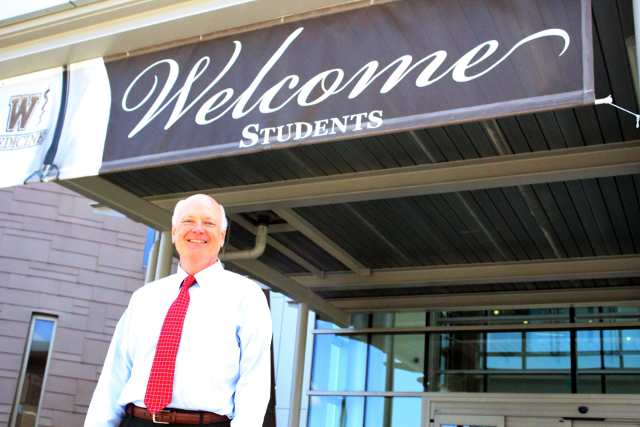
On the first day of each new school year, as he welcomes a new class of medical students to WMed, Dr. Hal B. Jenson recalls his first day of medical school at the George Washington University School of Medicine and Health Sciences.
He thinks about the excitement he felt, realizing his journey to becoming a doctor had begun.
Now, as the founding dean of WMed, Dr. Jenson said his years of experience as a physician and his work in academic medicine have taught him that the time one spends as a student and resident is about much more than knowledge gained and test scores.
“Medical school is not just for USMLE preparation,” Dr. Jenson said recently, referring to the standardized examinations that young physicians must pass to become licensed. “It is about knowledge, and gaining vital skills and abilities, but it’s also learning what it means to be a professional, and it’s about valuing the attitudes that shape our behaviors, the altruistic values that shape our character.”
That philosophy, Dr. Jenson said, drives the overall mission at WMed and was a shaping force behind the medical school’s Professional Code of Conduct and Educational Pledge for students, the more than 200 residents at WMed who are completing their medical training in Southwest Michigan, and all faculty and staff of the medical school.
With the arrival of new residents each June and new students in July, Dr. Jenson said the summer brings about growth in what he refers to as the WMed family. But, he said, it’s also important that the students and residents never forget that they are also part of the larger medical profession.
“Our responsibility is to ensure that students, residents, and faculty progress in their professional development. As a medical school, we have a responsibility to the medical profession at large to ensure that our students, residents, and faculty are meeting professional standards,” Dr. Jenson said. “Our Code of Professional Conduct and Educational Pledge embody the professional standards that, as a medical school, the rest of the medical profession is expecting us to uphold in our community.”
Dr. Jenson said faculty play a vital role in guiding students and residents as they navigate medical school and the next step in their training, respectively. The challenges of medical school and residency can be immense, and faculty are able to organize information in a logical way for learners so that, for example, students are able to build precept upon precept to understand very complicated topics and very complicated systems, he said.
“Faculty bring not just the facts, but the organization of the information and the clinical judgment that goes along with navigating those facts so the information is used in a constructive way,” Dr. Jenson said. “Some of those things you can’t test for. It is through the direct clinical supervision of students and residents that we assess judgment and insight and critical thinking and problem solving. Those abilities do not lend themselves to a written exam.”
“For students and residents, the acquisition of knowledge is necessary but not sufficient to be a caring and competent physician. You have to combine the knowledge with clinical judgment, and that clinical judgment comes from experience and practice.”
As that work for students and residents – and faculty – continues, Dr. Jenson said he is heartened by the growth the medical school has experienced since its start in July 2012 and the arrival of the inaugural MD class in 2014.
Next year, WMed will welcome its first residents for its new Obstetrics and Gynecology Residency Program. A new Family Medicine Residency Program at Bronson Battle Creek is anticipated to launch in 2019.
With the arrival of the MD Class of 2021 on July 31, there are now four classes of medical students at the medical school. Students in the inaugural Class of 2018 are preparing for Match Day on March 16, 2018, graduation in May, and then everything that awaits them in residency.
“We’re getting there,” Dr. Jenson said of the medical school’s growth and maturity. “In the admissions process, we’re now past adolescence. One of the reassuring outcomes is our first class of students are getting their scores back from USMLE Step 1, and they’ve done very well. It shows that we have done well as a medical school in educating and training our medical students.”
“This is another milestone for the medical school. Our medical students are well trained and prepared to enter residency training. We’re growing up as a medical school. In the next year or two we’re not going to look at ourselves as a ‘new’ school.”
